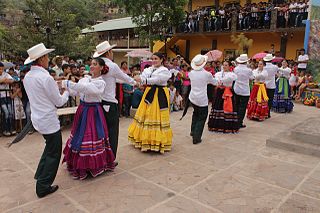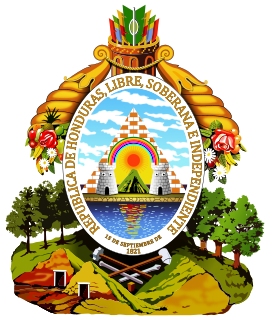
The Armed Forces of Honduras, consists of the Honduran Army, Honduran Navy and Honduran Air Force.

The wealth of cultural expression in Honduras owes its origins primarily to being a part of Latin America but also to the multi-ethnic nature of the country. The population comprises 85% Mestizo, 7% Caucasian, 6% Amerindian, and 2,9% Black. This influences all facets of the culture: customs, practices, ways of dressing, religion, rituals, codes of behavior and belief systems.

El Progreso is a city, with a population of 119,260, and a municipality located in the Honduran department of Yoro.

Liga de Ascenso is the second division of Honduran football; it was founded on 17 December 1979 as Segunda División and renamed Liga de Ascenso on 21 July 2002. The league is divided into 4 groups: Zona Norte y Atlántica, Zona Norte y Occidente, Zona Centro y Sur, Zona Sur y Oriente. The top 2 teams of each group qualifies for the liguilla (play-offs). Each season is divided into two tournaments, apertura (opening) and clausura (closing). The champion of the opening and closing tournament, compete for the promotion to Liga Nacional de Fútbol de Honduras in a two-legged match.

The Roman Catholic Archdiocese of Tegucigalpa is the only Metropolitan see in Honduras, whose ecclesiastical province covers the whole country.
The 1965–66 Honduran Liga Nacional season was the inaugural edition of the Honduran Liga Nacional. The season ran from 18 July 1965 to 23 January 1966. The format of the tournament consisted of a double round-robin schedule. Platense F.C. won the title after defeating España 2–0 in the last round at El Progreso.

The Universidad Católica de Honduras, officially named "Universidad Católica de Honduras Nuestra Señora Reina de la Paz", or "UNICAH" as it is affectionately called among its students, is a private university in Honduras run by the Catholic Church. It has 12 campuses in various cities, in the country such as:
The National Popular Resistance Front or National People's Resistance Front, frequently referred to as the National Resistance Front, is a wide coalition of Honduran grassroots organisations and political parties and movements that aims to restore elected President Manuel Zelaya and hold a constituent assembly to draw up a new constitution.

Rafael Pineda Ponce was a Honduran professor and politician in the Liberal Party of Honduras and President of the National Congress of Honduras from 1998 to 2002.

The Father José Trinidad Reyes y Sevilla was a Honduran priest who founded the National Autonomous University of Honduras, formerly called "La Sociedad del Genio emprendedor y del buen gusto". He advocated against poverty, assisting the poor and insisting on their right to education in matters of faith, culture and science.

Tegucigalpa, formally Tegucigalpa, Municipality of the Central District, and colloquially referred to as Tegus or Teguz, is the capital and largest city of Honduras along with its twin sister, Comayagüela.

The Church of Jesus Christ of Latter-day Saints in Honduras refers to The Church of Jesus Christ of Latter-day Saints and its members in Honduras. The first branch was formed in 1953. As of December 31, 2019, there were 180,646 members in 239 congregations in Honduras. In 2019, Honduras had the third most LDS Church members per capita in North America, behind the United States and El Salvador.
Ángel Alfredo Villatoro Rivera was a Honduran journalist and radio personality, who was kidnapped and killed in 2012 and is regarded as a "journalist martyr". He was one of the seven journalists killed in Honduras in 2012.
José Aníbal Delgado Fiallos was a Honduran scholar, political analyst and politician.
The 2014–15 Honduran Liga Nacional season was the 49th Honduran Liga Nacional edition, since its establishment in 1965. For this season, the system format remained the same as the previous season. The tournament began on 1 August 2014 and has ended in May 2015. On 20 December 2014, C.D. Motagua obtained its 13th national title after defeating C.D. Real Sociedad 2–1 on aggregate in the Apertura finals.
The 2015–16 Honduran Liga Nacional season was the 50th Honduran Liga Nacional edition, since its establishment in 1965. For this season, the system format remained the same as the previous season. The tournament began on 31 July 2015 and ended on 22 May 2016.
The Honduran Red Cross is a non-profit institution of social and voluntary organisation that provides help to at-risk populations and those affected by disasters. It is part of the international organization Red Cross and Half Moon Red Crescent, which was founded to protect human life and health, to ensure respect for all human beings, and to prevent and alleviate human suffering.

Paul Vinelli was an Italian-American-Honduran economist and banker. He was sent to Honduras in 1949 by the International Monetary Fund to advise the government on banking and tax legislation. He was instrumental in the creation of the Central Bank of Honduras and the National Bank for Agricultural Development in 1950. He remained working as an economic advisor to the Honduran government for six years. In future years he continued to be one of the strongest guides of Honduran economic policy.










